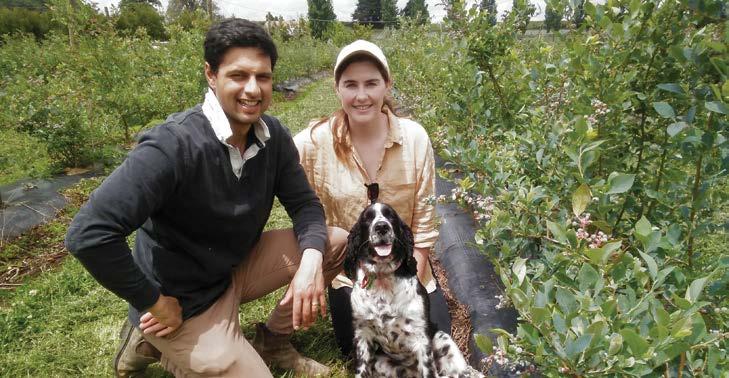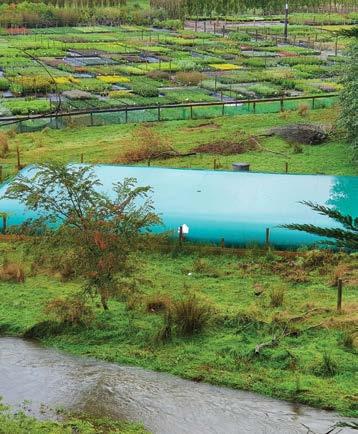
6 minute read
Future of growing top of mind for new generation
FEATURE
ARTICLE
Karn and Briar Dhaliwal with their dog, Pepper, on their Ohinewai blueberry orchard
Karn and Briar Dhaliwal have very clear goals as to where their horticultural business, Ohinewai Harvest, will go in the future. Thanks to their backgrounds working as fertiliser reps, rural bankers and agronomists, the 29-year-olds have an unwavering focus on the scale and efficiency of their operation as well as cost control. GLENYS CHRISTIAN reports.
Karn comes from a dairy farming background while Briar (née Kay) is from the Hawke’s Bay, where her parents are asparagus growers. The couple met at Massey University where Karn was completing a Bachelor of Commerce in farm management and Briar was finishing a Bachelor of Agricultural Science.
“But I did slip in a couple of horticultural papers,” she says. They both worked in Hawke’s Bay for fertiliser companies, then in 2017, saw the eighthectare block of land for sale opposite Karn’s parents’ dairy farm in Ohinewai, north Waikato. It was in pasture and being leased to the neighbouring dairy farm before they bought it. After moving north they took a year to decide what to grow on the land while grazing 30 head of cattle. “We thrive off a challenge, [but] it had to be a viable business,” Karn says. They looked first at blueberries, then veered away from the idea. Kiwifruit wasn’t the right crop for them to begin with either, and annual crops were ruled out because they didn’t want to cultivate their fertile peat soils on a regular basis. Karn and Briar visited a few successful blueberry orchards around the North Island and based on the information gathered they revised their decision, realising

The most recent planting of blueberries on the Dhaliwals’ Ohinewai blueberry orchard
that blueberries could be a scalable and profitable crop with potential to export, and there were packhouses within half an hour’s drive. The crop was also ideally suited for their peaty soil. The couple were welcomed by existing blueberry growers, keen to have new, young blood entering the industry. “From those visits we were also able to develop a model that would suit our situation in terms of planting density, levels of inputs, variety choice and so on,” says Karn. Four hectares of blueberries were planted out in winter 2020, comprised of three different varieties, Centra Blue®, Velluto Blue® and Sky Blue® – which produced seven tonnes of fruit last season destined for export to Australia. Now they have planted out another 3.5-ha while their older plants are being netted to protect from bird, hail and frost damage. They did have some frost damage recently, but nothing on the scale of other Waikato growers. Being further north and with their plants less mature, there was only a 20 to 30 percent loss of flower. “We feel very fortunate our losses weren’t too severe as it truly has been a devastating frost event to many other growers in the Waikato,” Briar says. “But it’s been a learning curve and we realise we need to invest more in frost protection.” Labour is always going to be challenging. While they only required four pickers during this year’s harvest, around 30 pickers will be required when their crop matures. They are working with the Ministry of Social Development (MSD) and are busy exploring the potential of attracting labour from nearby Huntly and Te Kauwhata, towns that other Waikato blueberry growers are less likely to recruit from. But blueberries aren’t the only string to their bow, with watermelons grown on leased land as well as pumpkins, and development of five-hectares of kiwifruit orchard well underway. The watermelons are grown on a different block every year – on a Te Kauwhata beef farmer and maize grower’s land. One hectare was

planted four years ago, all hand transplanted; then threehectares in 2020, six-hectares last year and 9.5-ha this year. They have invested in one key piece of machinery at a time that would improve efficiencies and have the most impact: opting first for a mechanical transplanter, then a mechanical mulch layer. The biodegradeable mulch made from corn starch fits with the operation’s sustainability goals and suits watermelons well, as the land will go back into grass. Karn and Briar do all the melon work themselves; laying the plastic mulch, transplanting and inter-row spraying until harvest where a small crew is required to get the crop off in a timely manner. It is sold locally, with the same going for the pumpkins that are grown just outside Ohinewai on another eight-hectare leased block. They started off growing butternut pumpkins, then a mix of this variety and crown pumpkins, before opting to only grow the crown pumpkins.
“We use contractors to disc, power harrow and plant the pumpkins, and then maintenance through to harvest is all us,” Karn says. “Compared with our other crops it’s a slow burn, and through the winter it’s good for our cashflow.” Kiwifruit plants are growing on the blueberry orchard in a nursery, ready for transplanting into the kiwifruit block and grafted over to red fruit. “We don’t do things for the short term, only things we can do for 20 years,” Karn says. “And we don’t listen to the talk around town but focus on the fundamentals.”
Last year Karn took out third place in the Young Vegetable Grower of the Year Competition and was called on to emcee this year’s award ceremony. He has also spent a year as an intern director for Vegetables NZ, getting a close-up view of how board decisions are made.
“We have got to where we are so far by sacrificing many weekends, doing late-night shifts and using annual leave to do as much of the work ourselves as possible,” Briar says. “Karn isn’t afraid to pick up the phone and cold call where opportunities might exist for the business, whether that’s marketing of our products or finding more lease land.” Their longer-term plans are to fine-tune their operations, then bring in a manager for part of their business to help with work-life balance. Ultimately, they would like to purchase 100-ha of land, giving them the space needed to get into running dry stock and utilising their own land for annual cropping.

Delicious Ohinewai blueberries
When it comes to other young people getting into the horticulture industry, Briar bases her optimism on people always needing food. But she says diversity is also key to their business.
“If one or two of our crops aren’t having a good year, hopefully the others will be,” she says. Karn believes the right mindset is paramount. “Deal with the right people who can help you develop your business and keep challenging the status quo. Our generation is going to bring the industry forward, so it’s up to people like us.”

www.precisede.co.nz Angus Clarke 027 498 3146 Allan Crouch 021 909 463










